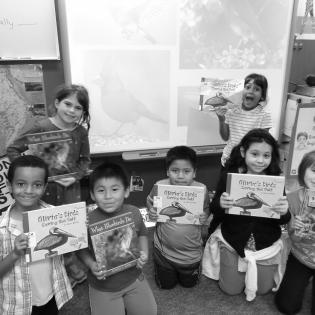Home Away from Home
Children listen to and respond to stories about the value of a home and the difficulties of not having a home. They make painted rocks or other comfort items and give them to a friend or donate them to a local shelter.
The learners will:
- define empathy, home, and empathy.
- make and donate homemade scarves or other comfort items.
- read-aloud copy of Lubna and Pebble by Wendy Meddour - this literature guide provides discussion starters and activities
- a variety of stones, large enough to decorate and write words on
- paint markers
Be sensitive to children who are homeless in your group or who have had other personal experiences with homelessness.
- service: to provide a community or organization with something that it needs
- home: a place where you live and feel comfortable, loved, and protected
- empathy: the ability to understand and care about the feelings of another
- donate: to give or present something, especially to a charitable organization or other good cause
- homeless: someone who has lost their home, or someone who lacks permanent housing
More Learning to Give literature guides with themes of finding home.
Instructions
Anticipatory Set:
Have children close their eyes and picture a place they feel safe, loved, and comfortable. It may be their bedroom, a natural place, or even at school. Discuss the importance and value of being home and in familiar surroundings.
Read aloud the book Lubna and Pebble by Wendy Meddour - this literature guide provides discussion starters and activities. Talk about how Lubna finds comfort when she doesn't have a home.
Ask: What did Lubna do that was difficult for her but helped Amir? Define empathy as putting oneself in another's place to understand their feelings. This Sesame Street video helps explain empathy
How did empathy help Lubna figure out how to help Amir?
Review that in Martin's Big Words, they learned about how one person can make a difference through service. Being generous can help the giver and the receiver of a kind act. List some ways kindness can help the person who is generous. What can we do to bring comfort to someone who is lonely or missing home?
Find a stone or pebble that has a pleasing shape and texture. Draw a design on it or words of encouragement and give it to someone as a gift to brighten their day. Painted stones or other comfort items may also be donated to a local shelter for people who are homeless or a local refugee center.
Philanthropy Framework
-
Strand PHIL.I Definitions of Philanthropy
-
Standard DP 01. Define Philanthropy
-
Benchmark E.1 Define philanthropy as the giving and sharing of time, talent, or treasure intended for the common good.
-
-
Standard DP 02. Roles of Government, Business, and Philanthropy
-
Benchmark E.6 Explain why acting philanthropically is good for the community, state, nation, or world.
-
-
-
Strand PHIL.III Philanthropy and the Individual
-
Standard PI 01. Reasons for Individual Philanthropy
-
Benchmark E.1 Describe one reason why a person might give or volunteer.
-
-
-
Strand PHIL.IV Volunteering and Service
-
Standard VS 01. Needs Assessment
-
Benchmark E.1 Identify a need in the school, local community, state, nation, or world.
-
-
Standard VS 03. Providing Service
-
Benchmark E.1 Provide a needed service.
-
-
Standard VS 05. Integrating the Service Experience into Learning
-
Benchmark E.3 Identify outcomes from the service.
-
-
